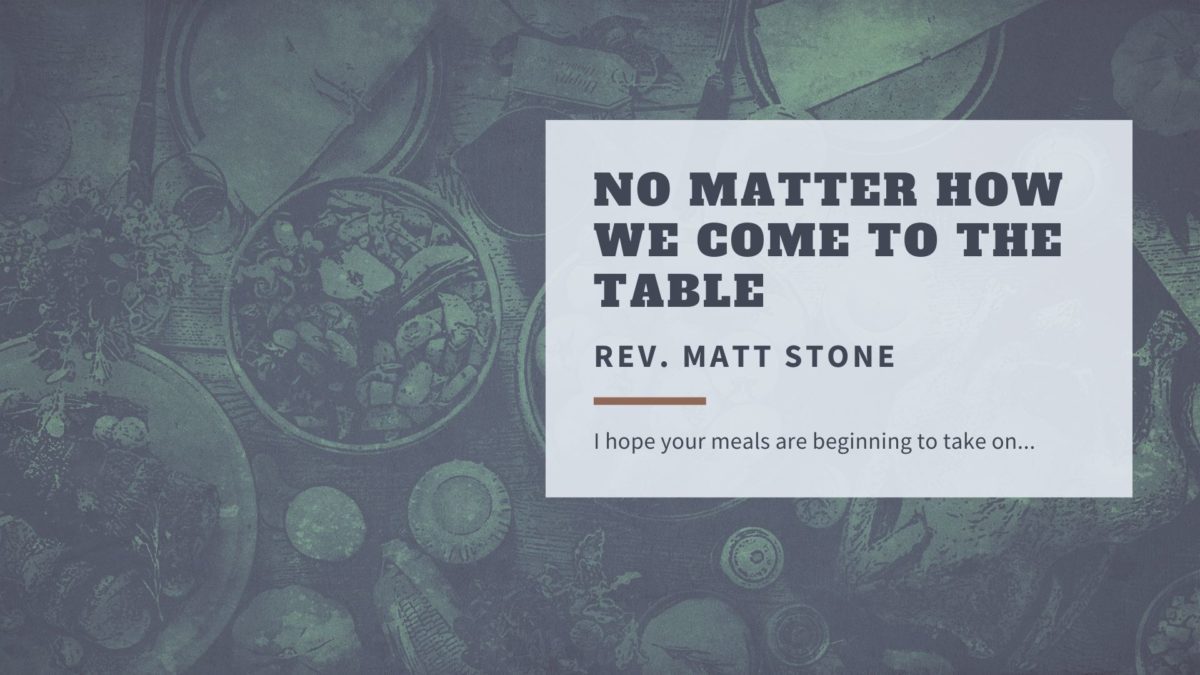PTCUMC Family,
I hope your meals are beginning to take on a new level of meaning and importance as we explore the meals that Jesus shares with his disciples and others throughout his ministry. After the first meal that Luke recalls in chapter 5 (with Levi and the tax collectors), Pastor Sean helped us explore the feeding of the 5,000 in Luke 9 last Sunday. If you weren’t able to join us, I hope you’ll go back and listen to his message (Click here to listen now), which landed with a phenomenal challenge to change what we do, not just what we think. I hope you’re taking his challenge to heart and that you will consider responding to his call for servants with our mission partners at Bashor Homeless Men’s Shelter this week. You can find a link below to the different ways to get involved. Please consider showing up for our neighbors!
Next Sunday we will continue moving forward in Jesus’s story to the next meal that Jesus shares with another group of Pharisees in Luke 11. It’s a handful, and I think you’ll be interested to hear what Jesus has to say to this particular group of leaders! However, I want to go backward in the story for a moment and pick up a meal that we skipped in our series planning (Luke shares 8 meals, of which we are only doing 5 on Sunday morning).
In Luke 7, Jesus shares a meal with one of the Pharisees, during which a woman from the community shows up uninvited and begins acting in ways that are more than a little strange to our ears. She approaches Jesus and begins to cry as she bathes his feet in her tears, dries them with her hair, kisses them and anoints them with ointment. These are absurd behaviors for our culture, so we’re often on the side of the Pharisee at first blush because we’re taken aback by her actions! They’re bizarre! But the problem isn’t the actions she takes- which were standard signs of hospitality, affection and adoration in 1st century Israel. Rather, the Pharisee believes the problem is the one doing the action: the woman is apparently a moral pariah and the so-called messiah shouldn’t have anything to do with her!
Yet she is exactly the one for whom Jesus came, and he understands her actions not as an inauthentic sign of a sinner who is pretending to be good, but those of a wounded woman who is deeply grateful to God for the love and acceptance He showed her. Jesus offers a beautiful, short parable (take a look here to read it) to reinforce his point that this woman is simply showing gratitude to the author of grace, as opposed to the Pharisee who would point to his own acts of righteousness as the source of his moral superiority. Then – at the climax of the meal – Jesus forgives her sin, declaring “your faith has saved you; go in peace.”
This is such a beautiful story that reminds us of Jesus’s power and desire to forgive us, no matter how we come to the table! And I love how it fits with the other two meals that we explored over the last two Sundays:
- Luke 5 – Jesus welcomes sinners
- Luke 7 – Jesus forgives sinners
- Luke 9 – Jesus provides abundantly for all of us
This progression of meal-time lessons is exactly why I’m so excited to explore these stories with you. When you put them together, we catch a unique insight into Jesus’s mission and ministry. His appetite for healing and forgiveness is expansive, and He desires for all of His children to experience the power of His grace!


